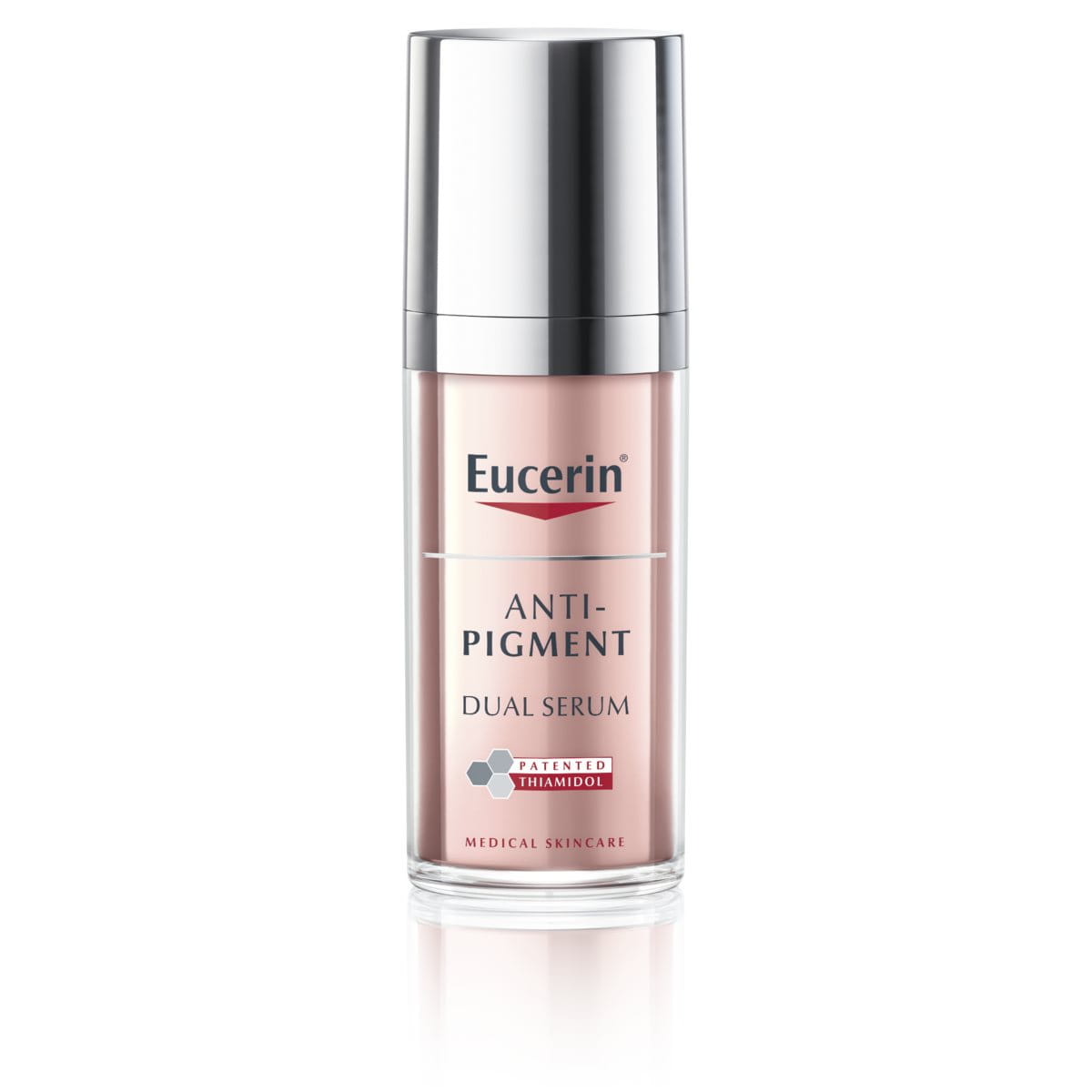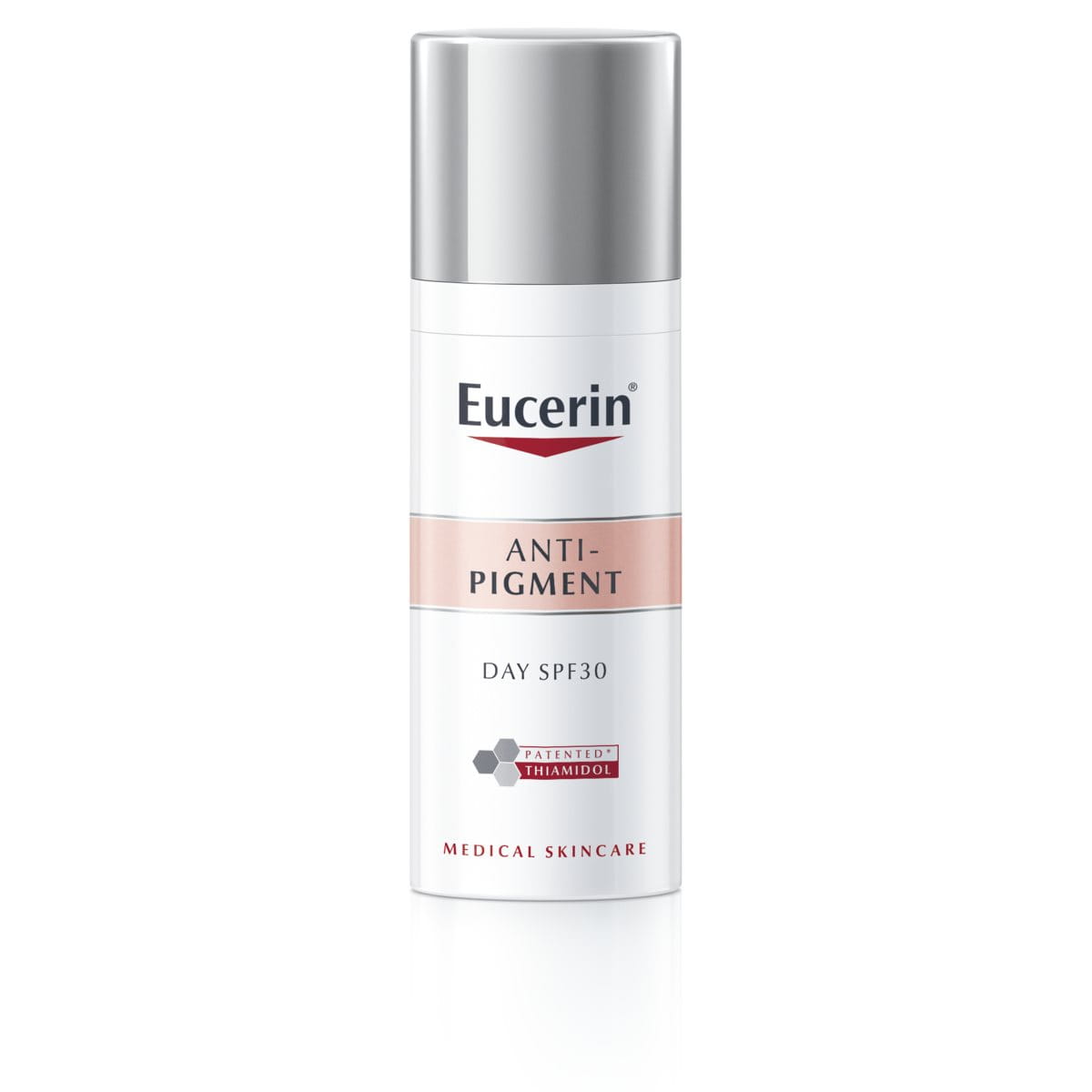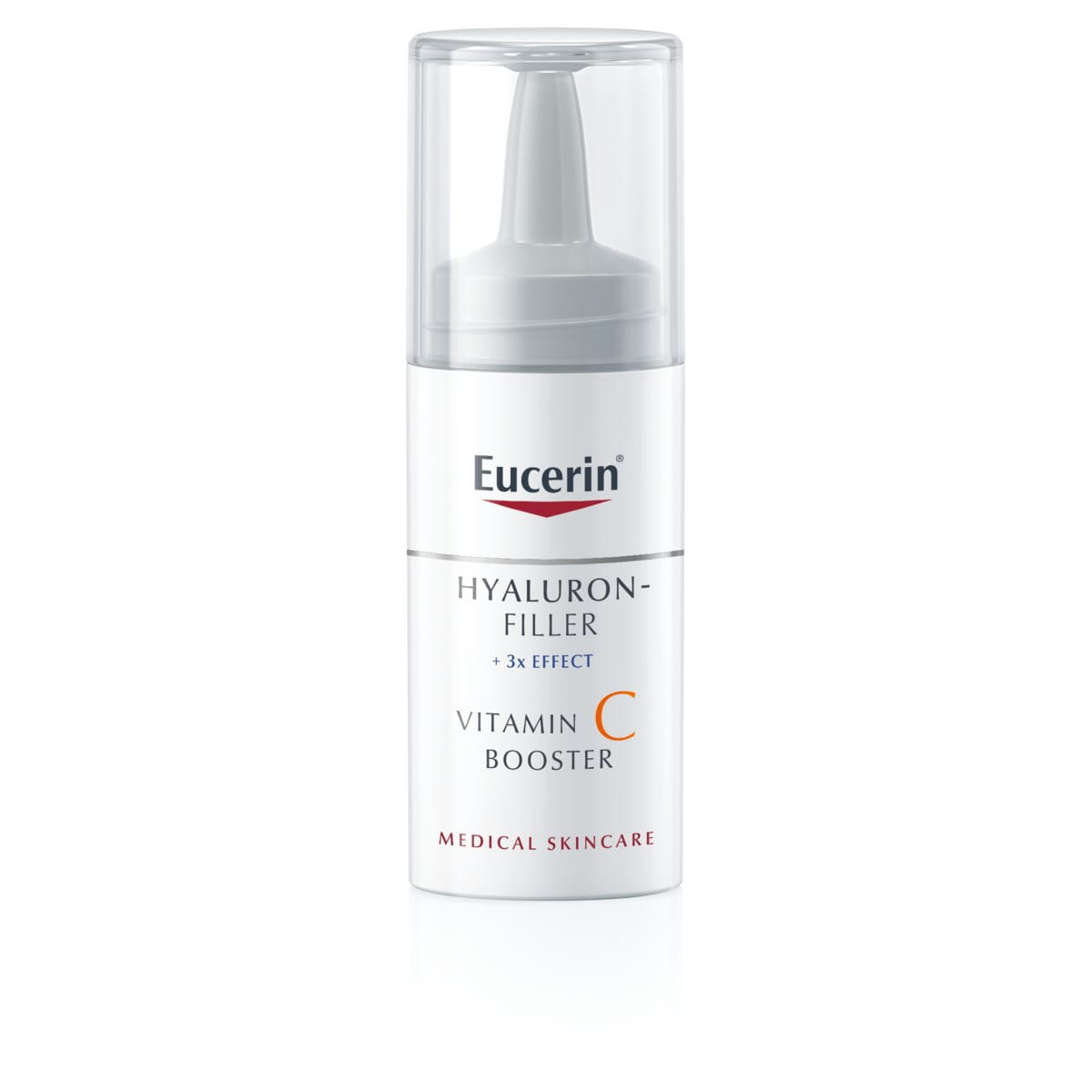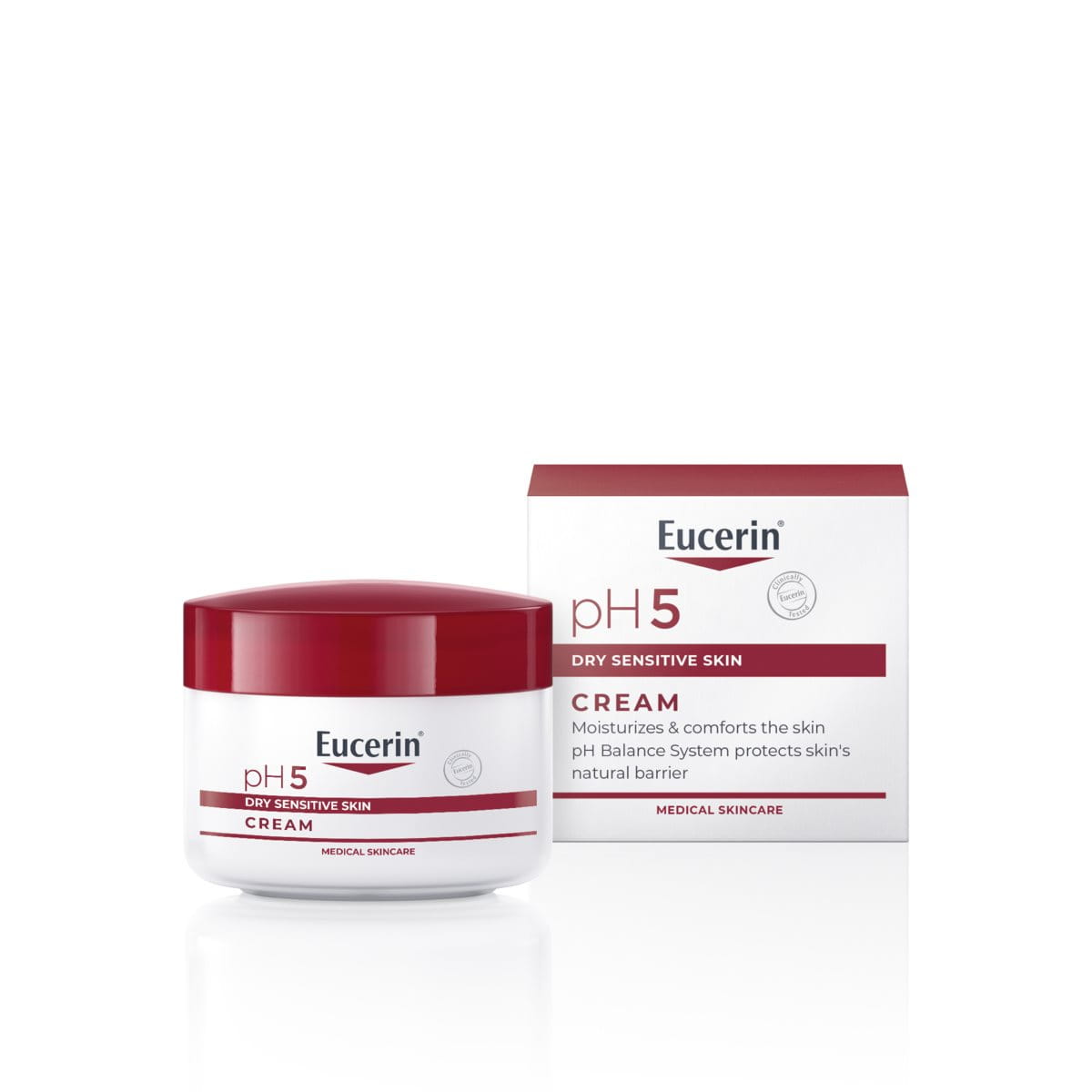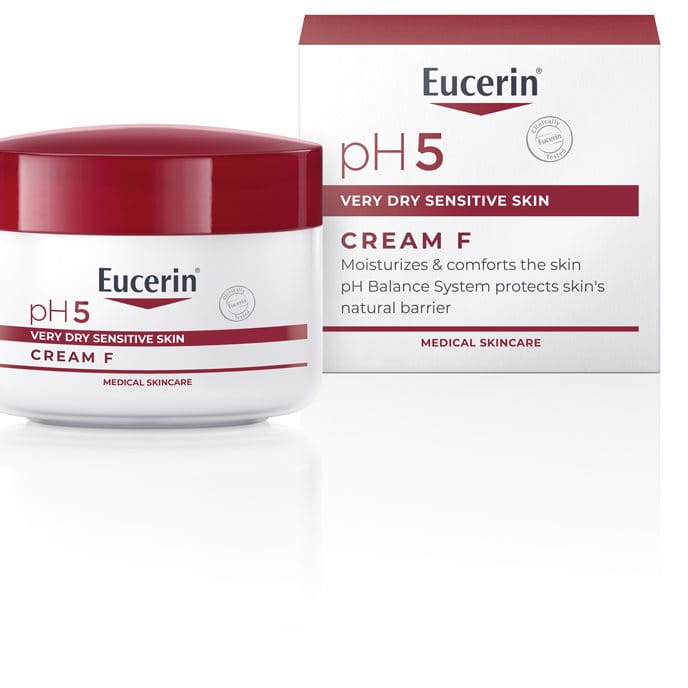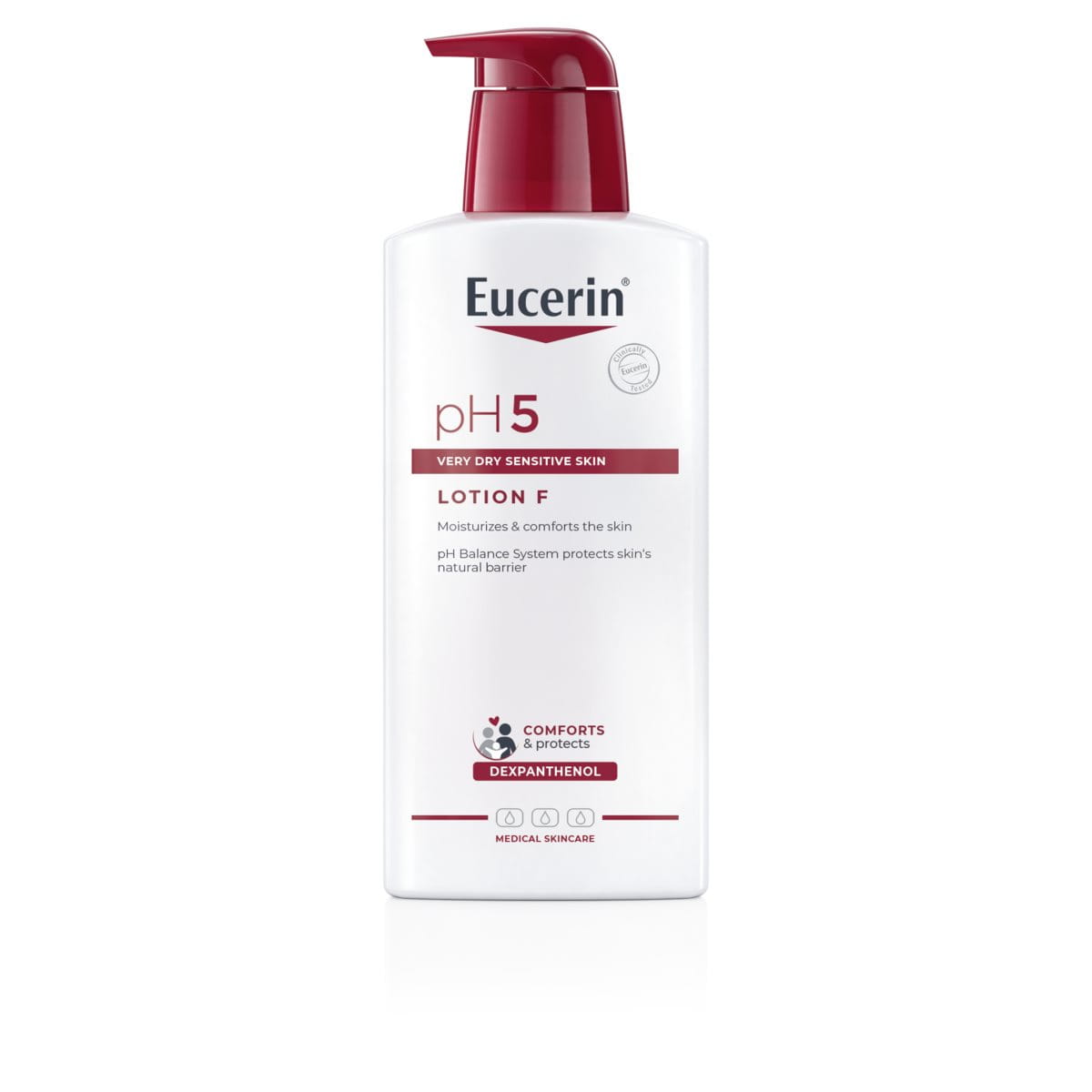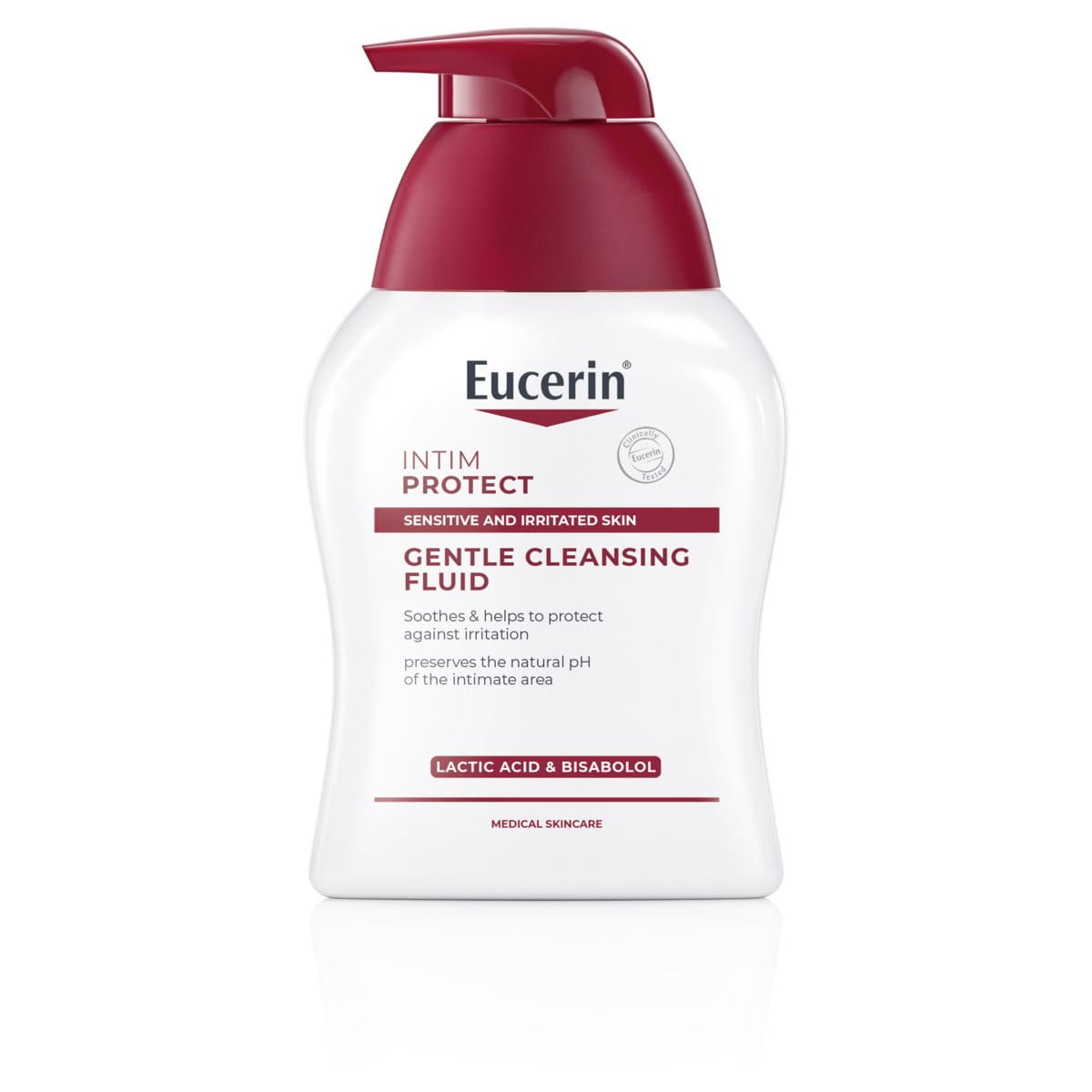Skin can become sensitive for many reasons, and any time in life, from babyhood to old age. Sensitivity occurs when skin’s protective barrier function is compromised, causing skin to become susceptible to external irritants, such as bacteria, chemical substances, allergens or others. Symptoms can appear on the face, body and scalp, and include redness, scaling and swelling. These can be itchy and disturbing in everyday life and can result in intense physical discomfort. While some people are predisposed to these ‘outbreaks’ of the condition, others are surprised by these sudden ‘skin moods’. Dry sensitive skin often reacts unpredictably and can appear anywhere on the body.
Understanding the importance of skin’s natural defenses, and the factors that weaken them, can help to decode the signs of sensitivity. The unpredictability of dry sensitive skin means that in many cases, effective solutions are about prevention rather than cure. The aim, therefore, is to control and minimize its causes and stimuli.
Signs & Symptoms
What is dry sensitive skin and how to recognize it
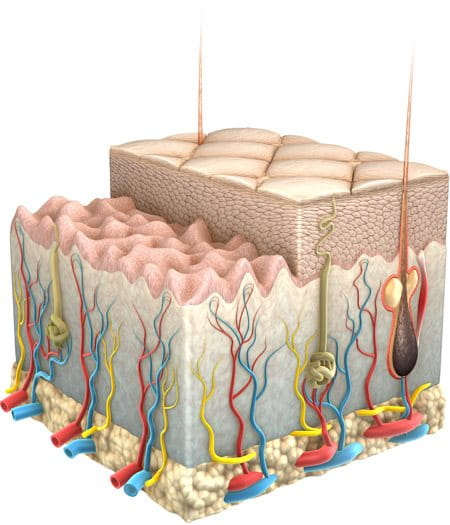

Skin has a natural protective barrier, which keeps bacteria and harmful substances from entering the body, while limiting water loss and preventing dehydration. This process keeps skin healthy and moisturized, maintaining its elasticity and firmness.
However, external factors such as climate and internal ones such as stress can undermine this process, weakening skin’s natural defenses and making it feel rough and dry. External stimuli can then exacerbate the situation, causing skin to become inflamed.
To recognise dry sensitive skin, look for:
• Visible signs such as erythema (redness or a rash), scaling, swelling or roughness
• Sensory signs such as itching, tightness, burning or stinging
Dry sensitive skin can occur on the face, lips, hands, body and scalp. It can also be triggered by physical change: either temporary, such as pregnancy, or ongoing, such as ageing. It shares some similarities with dry skin, but is not always related to that condition nor will its symptoms necessarily be alleviated by dry skin care solutions.
To recognise hypersensitive skin:
Dry sensitive skin is closely related to hypersensitive skin and the symptoms and triggers are similar. However, with hypersensitive skin, the skin's nerves are even more sensitive and reactions can therefore be more frequent or severe. Hypersensitive skin is not a disease, it is a sensory feeling caused by an increased sensitivity of the skin's nerves.
Typically sufferers experience uncomfortable sensations such as stinging, burning or itching - none of which are visible - and these can be accompanied by visible signs such as redness or dryness (although this is not always the case). In severe cases Rosacea or Couperose-prone skin can develop. Rosacea is a chronic inflammatory disorder that affects up to 10% of the adult population and is particularly prevalent among people with fair hair. Symptoms include erythema (redness), red bumps, red blood vessels and irritated eyes.
Important Information
If you are unsure about what skin condition you have, our skin test may be able to help. Alternatively, ask your pharmacist for advice. For a formal diagnosis you should consult your doctor or dermatologist.
Causes & Triggers
Causes of dry sensitive skin - how skin’s natural defenses become weakened
How skin protects itself
The uppermost layer of the epidermis is the horny layer (stratum corneum), which forms skin's barrier against the outside world. It prevents invasion by microorganisms and substances such as chemicals and allergens. It also minimises transepidermal water loss (TEWL), protecting the body from dehydration.
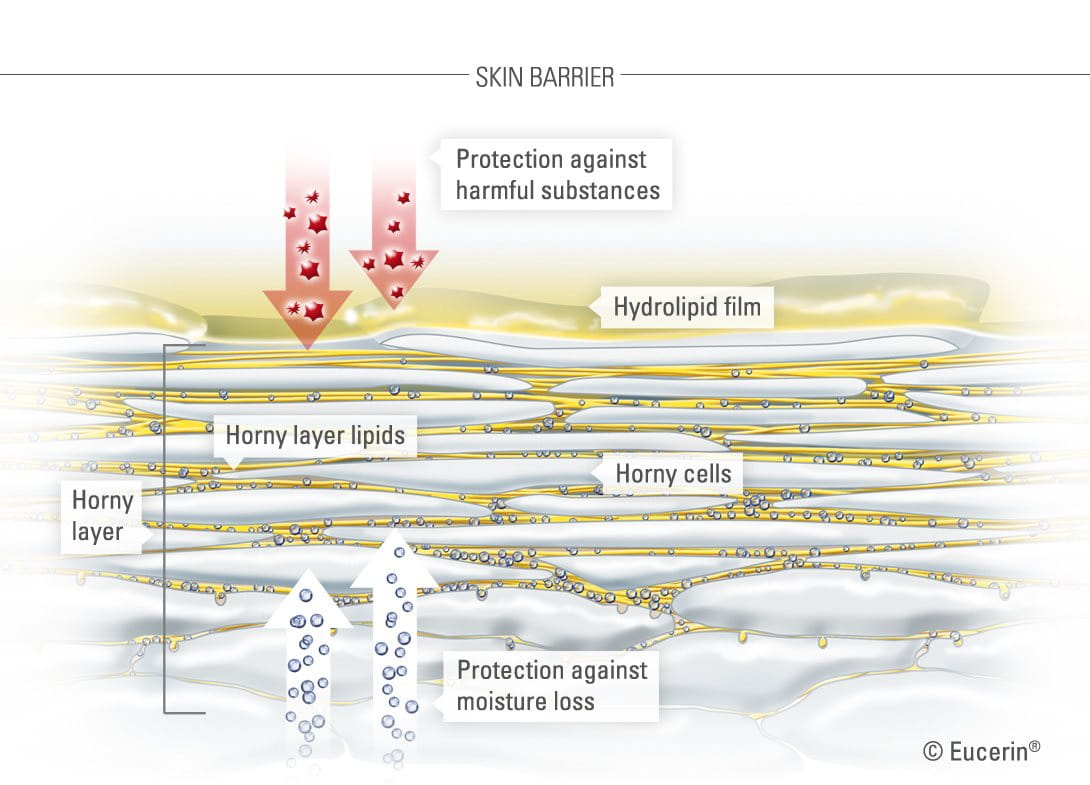
The horny layer resembles a wall, made up of 'bricks' or skin cells, which provide stability, and 'mortar' or epidermal lipids, which create permeability and at the same time a solid cohesion. On its surface is a protective acid mantle, the hydrolipid film. This emulsion of water (hydro) and fat (lipo) has a slightly acidic pH value of 5, this:
- maintains the healthy skin flora and skin scaling process (or desquamation), which is an essential part of skin’s renewal
- and neutralises alkaline substances such as soaps and conventional surfactants.
Irritants such as soaps can worsen skin’s condition through their alkalising effect, making it susceptible not only to inflammation but also infection from bacteria, viruses and fungi.
Internal causes of dry sensitive skin


- Baby skin is thinner and its barrier function more limited than that of adults, making baby skin far more sensitive to chemical, physical and microbial influences. Read more about skin in different ages.
- Conversely, as skin ages, substances that are integral to the structure and functioning of the hydrolipid film and protective acid mantle become scarce leading to a pH imbalance and increased water loss. The number of Aquaporins in skin also depletes with age. Aquaporins are skin’s own moisture distribution channels, which supply it with the water and Glycerol it needs to work as a protective barrier. When Aquaporins are depleted, skin’s barrier function can be compromised and water loss increases. This can make ageing skin more prone to dryness and sensitivity.
- Hormonal imbalance, brought on by stress or through specific life events such as pregnancy, the menstrual cycle, puberty or the menopause. This can reduce the effectiveness of the skin’s barrier function.
- Some people are more likely to experience irritated, sensitive skin. These include people with dry or damaged skin, Atopic Dermatitis, acne and hypersensitive skin conditions such as Rosacea, all of which may react to irritants such as perfumes and colorants.
- Undiagnosed or untreated intolerances and allergies to foods such as gluten, dairy, additives and eggs can result in skin inflammation and rashes.
- Dehydration, from excess sweating or lack of water, can also dry out skin, and place it under stress.
External causes of dry sensitive skin
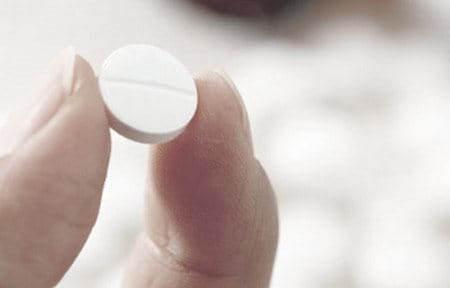
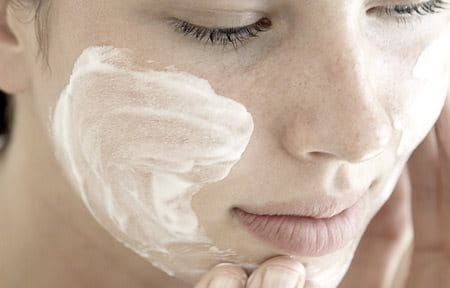
- Seasonal and climate changes, and fluctuations in temperature can all increase skin sensitivity. In cold weather, skin glands reduce their secretion of substances necessary for the maintenance of the protective acid mantle, causing skin to dry out. Central heating, air conditioning or the dry air in aeroplanes can also have this effect. In hot weather, skin glands produce more sweat, which evaporates, leaving skin feeling dry.
- An increased use of soaps and detergents with conventional surfactants can cause significant damage to skin’s surface, removing skin-protecting lipids and causing an imbalance in skin’s natural pH level.
- Some medical treatments such as radiotherapy and certain drugs can temporarily result in sensitive skin. It should clear up once the treatment ends.
Read more about factors that influence skin.
Contributing Factors
How actions and events can worsen the condition

An increase in attention to personal hygiene has meant that people are more likely to shower or bathe frequently in very hot water and rub themselves dry. This can result in a loss of Natural Moisturising Factors and surface lipids. Cleansers with conventional surfactants will clean skin, but will also dry it out.
Solutions
What can you do about dry sensitive skin?
Changing daily habits
Small changes to bathing habits can help restore skin’s protective barrier by reducing the temperature of the water, not spending so long in the shower or bath (especially in an area with hard water), using mild cleansers and patting the skin dry.
Recent research into nutrition has shown that an increase in food high in antioxidants and Vitamin C and low in carbohydrates and saturated fats can help stressed skin recover and return to a healthier condition. It can also make sense to check for food allergies or intolerances. Visit a nutritionist or your doctor if you think this might be the case. Also drinking enough water is important, especially for elderly people.
Stress management can also play its part in reducing skin sensitivity. Proven methods include taking regular exercise and practicing relaxation techniques.
It can be tempting only to respond to sensitive skin when it flares up. However, if you put a regular moisturising routine in place – and maintain it – these incidents may reduce and even disappear. This routine may differ for dry sensitive face and body skin.

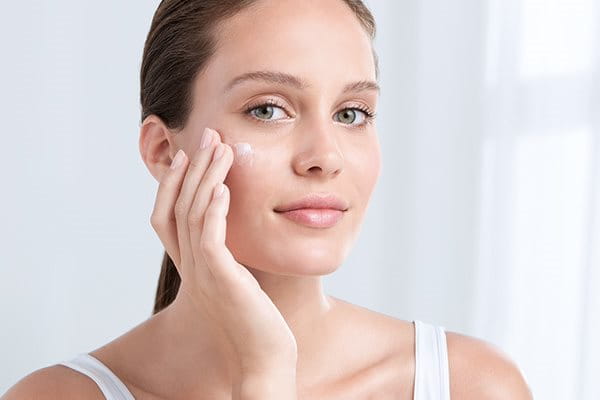
- Choosing skincare products
Dry sensitive skin is easily irritated by environmental triggers, making it even more sensitive. It requires more than gentle cleansing and moisturising to become less sensitive. - Cleansing dry sensitive skin
Many cleansers are so powerful they clean away not only the dirt on our skin but also the hydrolipid film that protects it. Look for products that contain mild surfactants that protect skin’s natural defenses and prevent it from drying out. Dry sensitive skin also benefits from ingredients that help to restore skin’s optimum pH.
All cleansers in the Eucerin pH5 range contain our pH Balance System with Citrate Buffer and extra mild surfactants to help restore skin’s optimum pH and prevent it from drying out. The formula has been clinically and dermatologically proven to be ideal for daily use on dry sensitive skin.
For your body: Choose from Eucerin pH5 Washlotion, Eucerin pH5 Soft Shower, Eucerin pH5 Shower Oil and Eucerin pH5 Soap-Free Bar.
For your hands: Due to frequent washing and regular exposure to the elements, hands can be particularly vulnerable to dryness and even cracking. Try Eucerin pH5 Soap-Free Bar or Eucerin pH5 Handwash Oil.
For your face: Facial dry sensitive skin also benefits from a dedicated, mild cleanser. We recommend Eucerin DermatoCLEAN Mild Cleansing Milk.
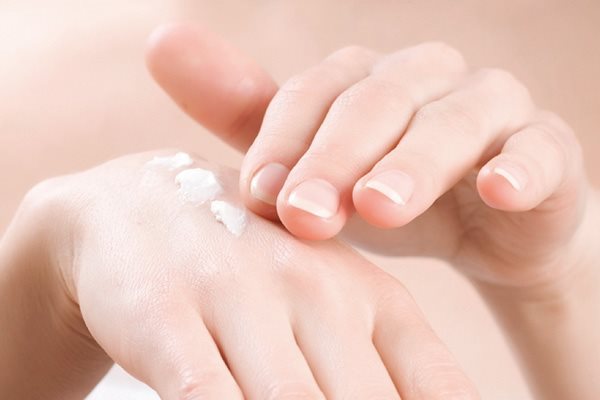
When choosing a moisturising product for dry sensitive skin, it isn’t enough to ensure it is free of irritants. The product needs to actively work below the surface of the skin, stimulating skin’s own regenerative processes and natural defenses.
Look out for products that include Dexpanthenol, an active ingredient known for its regenerative properties, and Citrate Buffer, which restores and supports skin’s natural pH.
All care products in the Eucerin pH5 range have been specially formulated to address the needs of dry sensitive skin. The formula contains the unique Eucerin pH Balance System with Citrate Buffer and Dexpanthenol to restore skin’s natural defenses and reduce skin sensitivity. The formula gives skin the daily hydration it needs and leaves it looking and feeling soft and smooth.
For your body: The range of creams and lotions includes: Eucerin pH5 Soft Body Cream and Eucerin pH5 Lotion.
For your hands: Try Eucerin pH5 Hand Cream
For your face: Try Eucerin pH5 Cream.
For your lips: Dry, rough and sensitive lips are soothed and protected by Eucerin Lip Active
From pregnancy to newborn baby
Hormonal changes in pregnancy can make skin suddenly sensitive. Gentle, natural oils can help reduce itchiness and the occurrence of stretch marks. Care products containing Vitamin E and high-quality vegetable oils that are rich in Linoleic Acid strengthen skin’s natural barrier function and enhance its elasticity. Try Eucerin Natural Caring Oil.
Once baby arrives, you may find his or her skin is also easily irritated and even inflamed. Extremely gentle, alkaline-free cleansers such as Eucerin pH5 Washlotion will prevent baby’s skin from drying out and is proven to be well-tolerated by infant skin. Read more about skin in different ages. Read more about skin in different ages.
Our brand values

We deliver a holistic dermo-cosmetic approach to protect your skin, keep it healthy and radiant.

We work together with leading dermatologist and pharmacist partners around the world to create innovative and effective skincare products they can trust and recommend.

For over 100 years, we have dedicated ourselves to researching and innovating in the field of skin science. We believe in creating active ingredients and soothing formulas with high tolerability that work to help you live your life better each day.
